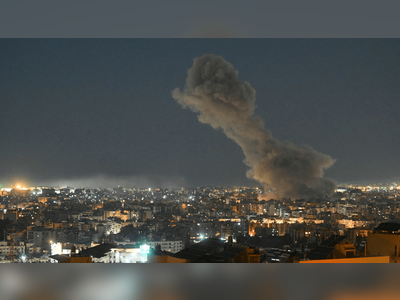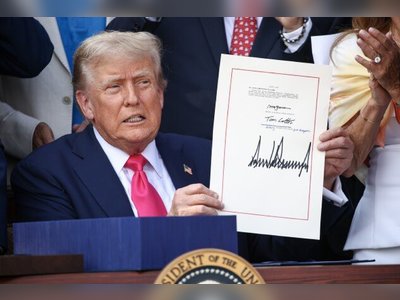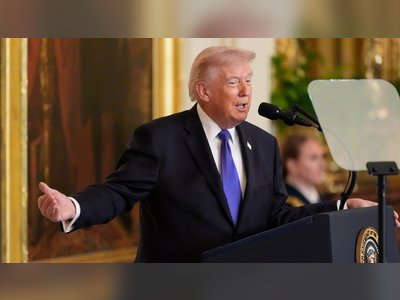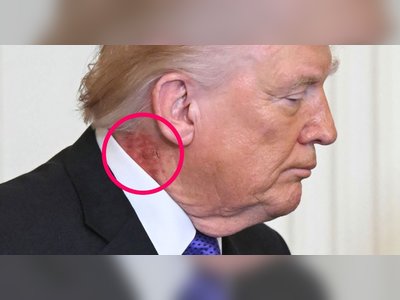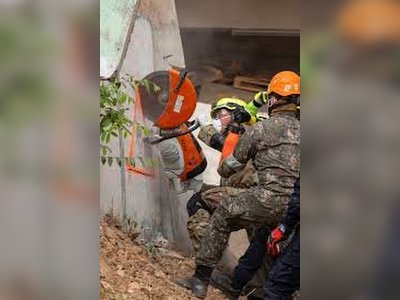
George Simion Leads in Romania's Presidential Election Rerun
Nationalist candidate from the far-right Alliance for the Union of Romanians secures 40% of votes, with runoff scheduled for May 18.
In Romania, the nationalist candidate George Simion has emerged as the front-runner in the first round of the rerun presidential election, securing approximately 40% of the votes.
This positions him as the clear favourite heading into the runoff election scheduled for May 18. The competition is intensified by the close race for second place, where Nicusor Dan, the liberal mayor of Bucharest, and Crin Antonescu, a candidate backed by the ruling coalition, are in a tie, each with around 21% of the votes.
This election comes six months after the previous presidential ballot was annulled due to allegations of campaign fraud and foreign interference, primarily relating to reports of significant Russian influence.
The earlier election was won by radical outsider Călin Georgescu, whose victory was subsequently invalidated by Romania’s Supreme Court following the revelation of alleged electoral misconduct involving Russian operatives.
Post-election, Simion expressed gratitude to his supporters, acknowledging their vote as an act of courage and solidarity.
He stated that the election transcends individual candidates, representing every Romanian who feels marginalized and disrespected.
On social media platform X, he emphasized the importance of national identity and rights.
Simion, affiliated with the far-right Alliance for the Union of Romanians (AUR), mirrors some aspects of U.S. politics, openly admiring former President Donald Trump and advocating for a strong NATO alliance, along with maintaining NATO bases and U.S. military presence in Romania should he attain the presidency.
The electoral landscape is closely monitored not only within Romania but also by European capitals, the United States, and key players in the ongoing conflict in Ukraine, as Romania serves as a vital corridor for military supplies to Ukraine.
Romania hosts a U.S. missile defense system and a number of strategic airbases, which play a crucial role in NATO's air policing operations over the Black Sea region.
Additionally, Romania plays a significant role in facilitating the export of Ukrainian grain through its waterways, coordinating agricultural exports that constitute a major part of global supply chains, particularly in light of recent disruptions due to the conflict.
Simion's campaign has tapped into public dissatisfaction concerning financial assistance sent to Ukrainian refugees.
While he has positioned himself as a defender of Romanian sovereignty, he asserts a clear stance against Russia, describing the neighboring country as a significant threat to Romania and other Eastern European nations.
The political environment remains precarious, with opinions divided on the implications of a potential Simion presidency for Romania's relationship with the West.
Analysts suggest that a far-right administration could alter Romania's current pro-Western trajectory, potentially challenging EU unity and aligning more closely with conservative nationalist movements.
In the realm of public sentiment, opinions fluctuate regarding the direction of Romanian politics, particularly following the historic vote on January 1, when Romania formally gained full access to the Schengen zone.
This recent progression has reshaped public frustration into cautious optimism for many voters moving into the upcoming runoff.
Voter turnout among Romania's diaspora, particularly those in Western Europe, could significantly influence the election outcome, as nearly a million Romanians are eligible to vote from abroad.
Their preferences remain largely unaccounted for in current polling but could sway the final results as the nation heads towards a pivotal decision regarding its leadership and future direction.
This positions him as the clear favourite heading into the runoff election scheduled for May 18. The competition is intensified by the close race for second place, where Nicusor Dan, the liberal mayor of Bucharest, and Crin Antonescu, a candidate backed by the ruling coalition, are in a tie, each with around 21% of the votes.
This election comes six months after the previous presidential ballot was annulled due to allegations of campaign fraud and foreign interference, primarily relating to reports of significant Russian influence.
The earlier election was won by radical outsider Călin Georgescu, whose victory was subsequently invalidated by Romania’s Supreme Court following the revelation of alleged electoral misconduct involving Russian operatives.
Post-election, Simion expressed gratitude to his supporters, acknowledging their vote as an act of courage and solidarity.
He stated that the election transcends individual candidates, representing every Romanian who feels marginalized and disrespected.
On social media platform X, he emphasized the importance of national identity and rights.
Simion, affiliated with the far-right Alliance for the Union of Romanians (AUR), mirrors some aspects of U.S. politics, openly admiring former President Donald Trump and advocating for a strong NATO alliance, along with maintaining NATO bases and U.S. military presence in Romania should he attain the presidency.
The electoral landscape is closely monitored not only within Romania but also by European capitals, the United States, and key players in the ongoing conflict in Ukraine, as Romania serves as a vital corridor for military supplies to Ukraine.
Romania hosts a U.S. missile defense system and a number of strategic airbases, which play a crucial role in NATO's air policing operations over the Black Sea region.
Additionally, Romania plays a significant role in facilitating the export of Ukrainian grain through its waterways, coordinating agricultural exports that constitute a major part of global supply chains, particularly in light of recent disruptions due to the conflict.
Simion's campaign has tapped into public dissatisfaction concerning financial assistance sent to Ukrainian refugees.
While he has positioned himself as a defender of Romanian sovereignty, he asserts a clear stance against Russia, describing the neighboring country as a significant threat to Romania and other Eastern European nations.
The political environment remains precarious, with opinions divided on the implications of a potential Simion presidency for Romania's relationship with the West.
Analysts suggest that a far-right administration could alter Romania's current pro-Western trajectory, potentially challenging EU unity and aligning more closely with conservative nationalist movements.
In the realm of public sentiment, opinions fluctuate regarding the direction of Romanian politics, particularly following the historic vote on January 1, when Romania formally gained full access to the Schengen zone.
This recent progression has reshaped public frustration into cautious optimism for many voters moving into the upcoming runoff.
Voter turnout among Romania's diaspora, particularly those in Western Europe, could significantly influence the election outcome, as nearly a million Romanians are eligible to vote from abroad.
Their preferences remain largely unaccounted for in current polling but could sway the final results as the nation heads towards a pivotal decision regarding its leadership and future direction.

